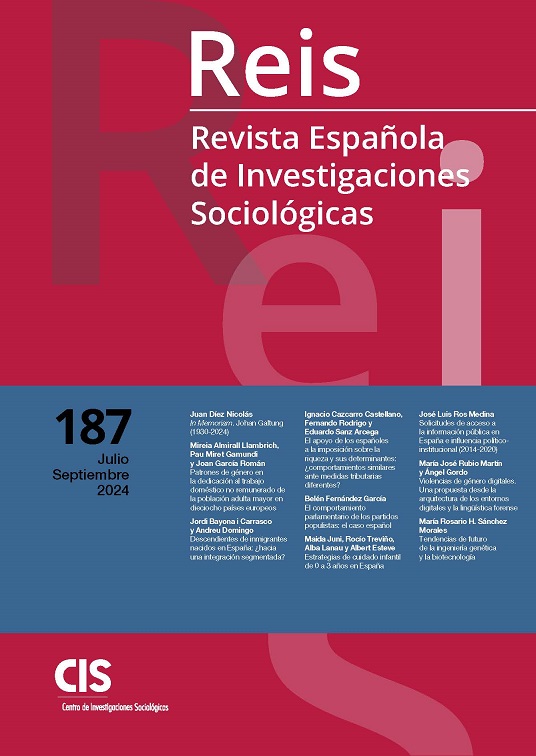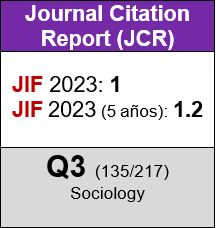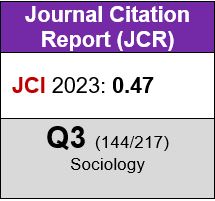Patrones de género en la dedicación al trabajo doméstico no remunerado de la población adulta mayor en dieciocho países europeos
DOI:
https://doi.org/10.5477/cis/reis.187.7-24Palabras clave:
Europa, Patrones regionales, Población mayor, SHARE, Trabajo doméstico no remuneradoResumen
En este artículo se analiza la dedicación al trabajo doméstico no remunerado de la población entre 55 y 71 años en dieciocho países
europeos. Se utiliza la encuesta SHARE, que incluye por primera vez un módulo específico de «usos del tiempo» para determinar la dedicación de mujeres y hombres al trabajo doméstico no remunerado. Los primeros resultados confirman que en los países del Mediterráneo y Este se destina más tiempo, pero que, en el centro, norte y este la relación es más equitativa. Para explicar estas diferencias se han clasificado los países en cuatro agrupaciones y se ha dibujado un patrón de género según las variables participación en el mercado laboral, nivel de estudios e ingresos, que han permitido determinar que es primordialmente una cuestión de género vinculada al contexto regional.
Descargas
Citas
Aassve, Arnstein; Fuochi, Giulia y Mencarini, Letizia (2014). «Desperate Housework Relative Resources, Time Availability, Economic Dependency, and Gender Ideology Across Europe». Journal of Family Issues, 35(8): 1000-1022. doi: 10.1177/0192513X14522248 DOI: https://doi.org/10.1177/0192513X14522248
Ajenjo, Marc y García-Román, Joan (2014). «Cambios en el uso del tiempo de las parejas ¿Estamos en el camino hacia una mayor igualdad?». Revista Internacional de Sociología, 72(2): 453-476. doi: 10.3989/ris.2012.05.28 DOI: https://doi.org/10.3989/ris.2012.05.28
Altintas, Evrim y Sullivan, Oriel (2016). «Fifty Years of Change Update: Cross-National Gender Convergence in Housework». Demographic Research, 35(16): 455-470. doi: 10.4054/DemRes.2016.35.16 DOI: https://doi.org/10.4054/DemRes.2016.35.16
Altuzarra, Amaia; Gálvez-Gálvez, Catalina y González-Flores, Ana (2020). «Do Spanish Dual-Earner Couples Share Unpaid Work Equally?». Social Indicators Research, 150: 731-763. doi: 10.1007/s11205-020-02346-3 DOI: https://doi.org/10.1007/s11205-020-02346-3
Anxo, Dominique; Mencarini, Letizia, Pailhé; Ariane, Solaz; Anne, Tanturri; Maria L. y Flood, Lennart (2011). «Gender Differences in Time Use over the Life Course in France, Italy, Sweden, and the US». Feminist Economics, 17(3): 159-195. doi: 10.1080/13545701.2011.582822 DOI: https://doi.org/10.1080/13545701.2011.582822
Batalova, Jeanne A. y Cohen, Philip N. (2002). «Premarital Cohabitation and Housework: Couples in Cross-National Perspective». Journal of Marriage and Family, 64: 743-755. doi: 10.1111/j.1741-3737.2002.00743.x DOI: https://doi.org/10.1111/j.1741-3737.2002.00743.x
Becker, G. (1985). «Human Capital, Effort, and the Sexual Division of Labor». Journal of Labor Economics, 3(1): 33-58. doi:10.1086/298075 DOI: https://doi.org/10.1086/298075
Benería, Lourdes; Berik, Günseli y Floro, Maria S. (2018). Trabajo remunerado y no remunerado: significados y debates. En: L. Benería; G. Berik y M. S. Floro (eds.). Género, desarrollo y globalización. Una visión desde la economía feminista. Manresa: Bellaterra Edicions.
Bergmann, Michael y Börsch-Supan, Axel (2021). Metodología SHARE Wave 8: Recopilación de datos de encuestas internacionales en tiempos de COVID-19. Munich: MEA, Instituto Max Planck de Derecho Social y Política Social.
Bianchi, Suzanne M.; Sayer, Liana C.; Milkie, Melissa A. y Robinson, John P. (2012). «Housework: who Did, Does or Will Do It, and How Much Does It Matter?». Social Forces, 91(1): 55-63. doi: 10.1093/sf/sos120 DOI: https://doi.org/10.1093/sf/sos120
Börsch-Supan, Axel (2022). Encuesta de Salud, Envejecimiento y Jubilación en Europa (SHARE) Wave 8. Versión de lanzamiento: 8.0.0. doi: 10.6103/COMPARTIR.w8.800
Börsch-Supan, Axel; Brandt, Martina; Hunkler, Christian; Kneip, Thorsten; Korbmacher, Julie; Malter, Frederic; Schaan, Barbara; Stuck, Stephanie y Zuber, Sabrina (2013). «Perfil de recursos de datos: la Encuesta de Salud, Envejecimiento y Jubilación en Europa (SHARE)». Revista Internacional de Epidemiología, 42(4): 992-1001. doi: 10.1093/ije/dyt088 DOI: https://doi.org/10.1093/ije/dyt088
Brines, Julie (1994). «Economic Dependency, Gender, and the Division of Labor at Home». American Journal of Sociology, 100(3): 652-688. doi: 10.1086/230577 DOI: https://doi.org/10.1086/230577
Buhlmann, Felix; Elcheroth, Guy y Tettamanti, Manuel (2010). «The Division of Labour Among European Couples: The Effects of Life Course and Welfare Policy on Value-Practice Configurations». European Sociological Review, 26(1): 49-66. doi: 10.1093/esr/jcp004 DOI: https://doi.org/10.1093/esr/jcp004
Coltrane, Scott (2000). «Research on Household Labor: Modeling and Measuring the Social Embeddedness of Routine Family Work». Journal of Marriage and the Family, 62: 1208-1233. doi: 10.1111/j.1741-3737.2000.01208.x DOI: https://doi.org/10.1111/j.1741-3737.2000.01208.x
Davis, Shannon y Greenstein, Theodore (2004). «Cross-National Variations in the Division of Household Labor». Journal of Marriage and Family, 66: 1260-1271. doi: 10.1111/j.0022-2445.2004.00091.x DOI: https://doi.org/10.1111/j.0022-2445.2004.00091.x
Durán-Heras, María Á. (2012). Las fronteras entre el trabajo y el empleo. En: M. A. Durán Heras (ed.). El trabajo no remunerado en la economía global. Bilbao: Fundación BBVA.
England, Paula (2010). «The Gender Revolution: Uneven and Stalled». Gender & Society, 24(2): 149-166. doi: 10.1177/0891243210361475 DOI: https://doi.org/10.1177/0891243210361475
Esping-Andersen, Gøsta (1990). «The Three Political Economies of the Welfare State». International Journal of Sociology, 20 (3): 92-123. doi: 10.1080/15579336.1990.11770001 DOI: https://doi.org/10.1080/15579336.1990.11770001
Evertsson, Marie; England, Paula; Mooi-Reci, Irma; Hermsen, Joan; Bruijn, Jeanne de y Cotter, David (2009). «Is Gender Inquality Greater at Lower or Higher Educational Levels? Common Patterns in the Netherlands, Sweden, and the United States». Oxford University Press: 210-241. doi: 10.1093/sp/jxp008 DOI: https://doi.org/10.1093/sp/jxp008
Fodor, Eva (2005) «Women at Work: The Status of Women in the Labour Markets of the Czech Republic, Hungary and Poland». United Nations Research Institute for Social Development (UNRISD), Occasional Paper: 3.
Fuwa, Makiko (2004). «Macro-level Gender Inequality and the Division of Household Labor in 22 Countries». American Sociological Review, 69: 751-767. doi: 10.1177/000312240406900601 DOI: https://doi.org/10.1177/000312240406900601
Gálvez-Muñoz, Lina; Rodríguez-Modroño, Paula y Domínguez-Serrano, Mónica (2011). «Work and Time Use By Gender: A New Clustering of European Welfare Systems». Feminist Economics, 17(4): 125-157. doi: 10.1080/13545701.2011.620975 DOI: https://doi.org/10.1080/13545701.2011.620975
García-Román, Joan (2023). «Does Women's Educational Advantage Mean a More Egalitarian Distribution of Gender Roles? Evidence from Dual-earner Couples in Spain». Journal of Family Studies, 29 (1): 285-305. doi: 10.1080/13229400.2021.1915852 DOI: https://doi.org/10.1080/13229400.2021.1915852
Gauthier, Anne H. y Smeeding, Timothy M. (2003). «Time Use at Older Ages: Cross-National Differences». Research on Aging, 25(3): 247-274. doi: 10.1177/0164027503025003003 DOI: https://doi.org/10.1177/0164027503025003003
Goldscheider, Frances; Bernhardt, Eva y Lappegard, Trude (2015). «The Gender Revolution: A Framework for Understanding Changing Family and Demographic Behavior». Population and Development Review, 41(2): 207-239. doi: 10.1111/j.1728-4457.2015.00045.x DOI: https://doi.org/10.1111/j.1728-4457.2015.00045.x
Greenstein, Theodore (2000). «Economic Dependence, Gender, and the Division of Labor in the Home: A Replication and Extension». Journal of Marriage and the Family, 62: 322-335. doi: 10.1111/j.1741-3737.2000.00322.x DOI: https://doi.org/10.1111/j.1741-3737.2000.00322.x
Gupta, Sanjiv (2007). «Autonomy Dependence or Display? The Relationship Between Married Women’s Earnings and Housework». Journal of Marriage and Family, 69: 399-417. doi: 10.1111/j.1741-3737.2007.00373.x DOI: https://doi.org/10.1111/j.1741-3737.2007.00373.x
Hank, Karsten y Jürges, Hendrik (2007). «Gender and the Division of Household Labor in Older Couples. A European Perspective». Journal of Family Issues, 28(3): 399-421. doi: 10.1177/0192513X06296427 DOI: https://doi.org/10.1177/0192513X06296427
Healy, Judith M. (1988). «Elderly Couples and the Division of Household Tasks». Australian Journal of Sex, Marriage and Family, 9(4): 203-214. doi: 10.1080/00021369.1988.11005976 DOI: https://doi.org/10.1080/00021369.1988.11005976
Hochschild, Arlie y Machung, Anne (1989). The Second Shift. Working Parents and the Revolution at Home. New York: Viking Penguin.
Hook, Jennifer L. (2006). «Care in Context Men’s Unpaid Work in 20 Countries, 1965-2003». American Sociological Review, 71: 639-660. doi: 10.1177/000312240607100406 DOI: https://doi.org/10.1177/000312240607100406
Horne, Rebecca M.; Johnson, Matthew D.; Galambos, Nancy L. y Krahn, Harvey J. (2018). «Time, Money, or Gender? Predictors of the Division of Household Labour across life Stages». Sex Roles, 78: 731-743. doi: 10.1007/s11199-017-0832-1 DOI: https://doi.org/10.1007/s11199-017-0832-1
Kamo, Yoshinori (2000). «“He Said, She Said”: Assessing Discrepancies in Husbands' and Wives' Reports on the Division of Household Labor». Social Science Research, 29(4): 459-476. doi: 10.1006/ssre.2000.0674 DOI: https://doi.org/10.1006/ssre.2000.0674
Kan, Man Yee; Sullivan, Oriel y Gershuny, Jonathan (2011). «Gender Convergence in Domestic Work: Discerning the Effects of Interactional and Institutional Barriers from Large-scale Data». Sociology, 45(2): 234-251. doi: 10.1177/0038038510394014 DOI: https://doi.org/10.1177/0038038510394014
Kan, Man Yee; Zhou, Muzhi; Negraia, Daniela V.; Kolpashnikova, Kamila; Hertog, Ekaterina; Yoda, Shohei y Jun, Jiweon (2021). «How do Older Adults Spend Their Time? Gender Gaps and Educational Gradients in Time Use in East Asian and Western Countries». Journal of Population Ageing, 14(4): 537-562. doi: 10.1007/s12062-021-09345-3 DOI: https://doi.org/10.1007/s12062-021-09345-3
Kan, Man Yee; Zhou, Muzhi; Kolpashnikova, Kamila; Hertog, Ekaterina; Yoda, Shohei y Jun, Jiweon (2022). «Revisiting the Gender Revolution. Time on Paid Work, Domestic Work, and Total Work in East Asian and Western Societies 1985-2016». Gender & Society, 36(3): 368-396. doi: 10.1177/08912432221079664 DOI: https://doi.org/10.1177/08912432221079664
Kil, Tine; Neels, Karel y Vergauwen, Jorik (2016). Gender Inequality in the Division of Housework over the Life Course: A European Comparative Perspective. En: D. Mortelmans; K. Matthijs; E. Alofs y B. Segaert (eds.). Changing Family Dynamics and Demographic Evolution - The Family Kaleidoscopek. Edward Elgar. DOI: https://doi.org/10.4337/9781785364983.00010
Lachance-Grzela, Mylène y Bouchard, Geneviève (2010). «Why Do Women Do the Lion’s Share of Housework? A Decade of Research». Sex Roles, 63: 767-780. doi: 10.1007/s11199-010-9797-z DOI: https://doi.org/10.1007/s11199-010-9797-z
Lázaro, Nieves; Moltó, María L.; Sánchez, Rosario y Simó-Noguera, Carles (2022). «Desigualdad de género en el trabajo doméstico en España. ¿Compartir el trabajo doméstico en pareja está condicionado únicamente por la racionalidad económica?». Revista Española de Investigaciones Sociológicas, 180: 85-104. doi: 10.5477/cis/reis.180.85 DOI: https://doi.org/10.5477/cis/reis.180.85
Leopold, Thomas y Skopek, Jan (2014). «Gender and the Division of Labor in Older Couples: How European Grandparents Share Market Work and Childcare». Social Forces, 93(1): 63-91. doi: 10.1093/sf/sou061 DOI: https://doi.org/10.1093/sf/sou061
Leopold, Thomas y Skopek, Jan (2015). «Convergence or Continuity? The Gender Gap in Household Labor After Retirement». Journal of Marriage and Family, 77(4): 819-832. doi: 10.1111/jomf.12199 DOI: https://doi.org/10.1111/jomf.12199
Letablier, Marie-Thérèse (2007). El trabajo de «cuidados» y su conceptualización en Europa. En: C. Prieto (ed.). Trabajo, género y tiempo social. Madrid: Editorial Complutense.
Lewis, Jane (1992). «Gender and the Development of Welfare Regimes». Journal of European Social Policy, 2(3). doi: 10.1177/095892879200200301 DOI: https://doi.org/10.1177/095892879200200301
ONU (2019). El progreso de las mujeres en el mundo 2019-2020: familias en un mundo cambiante. New York: ONU Mujeres.
Pailhé, Ariane; Solaz, Anne y Stanfors, Maria (2021). «The Great Convergence: Gender and Unpaid Work in Europe and the United States». Population and Development Review, 47(1): 181-217. doi: 10.1111/padr.12385 DOI: https://doi.org/10.1111/padr.12385
Saxonberg, Steven y Szelewa, Dorota (2007). «The Continuing Legacy of the Communist Legacy? The Development of Family Policies in Poland and the Czech Republic». Social Politics: International Studies in Gender, State & Society, 14(3): 351-379. doi: 10.1093/sp/jxm014 DOI: https://doi.org/10.1093/sp/jxm014
Sayer, C. Liana (2010). Trends in Housework. En: J. Treas y S. Drobnic (eds.). Dividing the Domestic. Stanford: Stanford University Press.
Stier, Haya y Lewin-Epstein, Noah (2007). «Policy Effects on the Division of Housework». Journal of Comparative Policy Analysis, 9(3): 235-259. doi: 10.1080/13876980701494657 DOI: https://doi.org/10.1080/13876980701494657
Sullivan, Oriel (2021). The Gender Division of Housework and Child Care. En: N. F. Schneider y M. Kreyenfeld (eds.). Research Handbook on the Sociology of the Family. Cheltenham, UK: Edward Elgar Publishing.
West, Candace y Zimmerman, Don H. (1987). «Doing Gender». Gender and Society, 1(2): 125-151. doi: 10.1177/0891243287001002002 DOI: https://doi.org/10.1177/0891243287001002002
Descargas
Publicado
Cómo citar
Número
Sección
Licencia
Derechos de autor 2024 Revista Española de Investigaciones Sociológicas

Esta obra está bajo una licencia internacional Creative Commons Atribución-CompartirIgual 4.0.
Permite Compartir — copiar y redistribuir el material en cualquier medio o formato, Adaptar — remezclar, transformar y construir a partir del material para cualquier propósito, incluso comercialmente.








